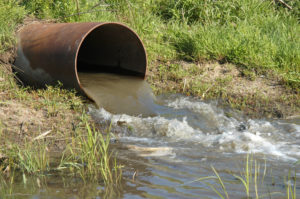Episode 6: The National Pollutant Discharge Elimination System (NPDES) Permit Program
The sixth episode of the “Clean Water Pod” podcast explores the Clean Water Act’s National Pollutant Discharge Elimination System permit program, commonly referred to by its acronym, “NPDES.” To discuss how this program improves water quality, host Jeff Berckes is joined by guests Jeff Poupart, section chief of Water Quality Permitting with the North Carolina Department of Environmental Quality, and Joe Haberek, administrator of Surface Water Protection in the Rhode Island Department of Environmental Management’s Office of Water Resources.
“The NPDES program is basically a program that regulates point source discharges of pollutants to waters of the state, and on the federal NPDES level, to the Waters of the U.S.,” explains Haberek.
 The term “point source” means any discernible, confined and discrete conveyance, according to the U.S. EPA, and can include a pipe, ditch or channel. The trio speaks about levels of treatment for point source discharges, the types of NPDES permits, who needs a permit, and how they are developed. They conclude the episode by sharing career accomplishments within their respective states related to the NPDES program, including reopening areas to shellfishing in Rhode Island for the first time in over 70 years, removing two major rivers from the impaired waters list, combined sewer overflow (CSO) control and successfully permitting coal ash leachate.
The term “point source” means any discernible, confined and discrete conveyance, according to the U.S. EPA, and can include a pipe, ditch or channel. The trio speaks about levels of treatment for point source discharges, the types of NPDES permits, who needs a permit, and how they are developed. They conclude the episode by sharing career accomplishments within their respective states related to the NPDES program, including reopening areas to shellfishing in Rhode Island for the first time in over 70 years, removing two major rivers from the impaired waters list, combined sewer overflow (CSO) control and successfully permitting coal ash leachate.
Listen to episode six here, or tune in wherever you get your podcasts, including Apple Podcasts, Spotify and Google Podcasts.
Follow @CleanWaterPod on Twitter for the latest updates.
About The Clean Water Pod
Through perspectives and stories from across the country, the “Clean Water Pod” explores the challenges and successes of restoring and protecting water quality. Season one of the podcast focuses on the fundamentals of the Clean Water Act.
This podcast is funded by a grant through the U.S. EPA and produced by Flip the Field and NEIWPCC.
Learn more about our work around the Clean Water Act 303(d) program.